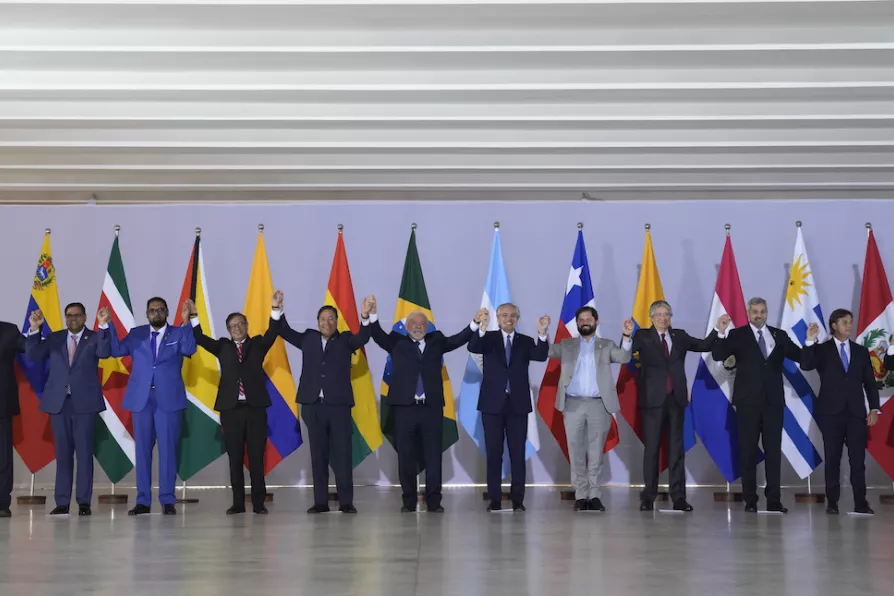
 Leaders of South American nations pose for a group photo during the South American Summit at Itamaraty palace in Brasilia, Brazil, Tuesday, May 30, 2023. From left; Venezuela's President Nicolas Maduro, Suriname's President Chan Santokhi, Guyana's President Mohamed Irfaan Ali, Colombia's President Gustavo Petro, Bolivia's President Luis Arce, Brazilian President Luiz Inacio Lula da Silva, Argentina's President Alberto Fernandez, Chile's President Gabriel Boric, Ecuador's President Guillermo Lasso, Paraguay's President Mario Abdo Benitez, Uruguay's President Luis Lacalle Pou and Peru's Prime Minister Alberto Otarola.
Leaders of South American nations pose for a group photo during the South American Summit at Itamaraty palace in Brasilia, Brazil, Tuesday, May 30, 2023. From left; Venezuela's President Nicolas Maduro, Suriname's President Chan Santokhi, Guyana's President Mohamed Irfaan Ali, Colombia's President Gustavo Petro, Bolivia's President Luis Arce, Brazilian President Luiz Inacio Lula da Silva, Argentina's President Alberto Fernandez, Chile's President Gabriel Boric, Ecuador's President Guillermo Lasso, Paraguay's President Mario Abdo Benitez, Uruguay's President Luis Lacalle Pou and Peru's Prime Minister Alberto Otarola.
BRAZIL’S President Lula invited all 13 presidents from South America to a summit on May 30 aimed at developing a collective and “common vision and relaunching decisive actions for sustainable development, peace and the well-being of our peoples.”
Lula presented 10 proposals to bring about the region’s rapprochement — a consensual approach to economic, social and cultural issues.
Peru’s de facto ruler Dina Boluarte was not present because Peru’s right-wing congress did not authorise her to attend.

International solidarity can ensure that Trump and his machine cannot prevail without a level of political and economic cost that he will not want to pay, argues CLAUDIA WEBBE

Far-right forces are rising across Latin America and the Caribbean, armed with a common agenda of anti-communism, the culture war, and neoliberal economics, writes VIJAY PRASHAD

LEE BROWN highlights the latest attempts to undo progressive reforms instated during the presidency of Rafael Correa

FRANCISCO DOMINGUEZ says the US’s bullying conduct in what it considers its backyard is a bid to reassert imperial primacy over a rising China — but it faces huge resistance










